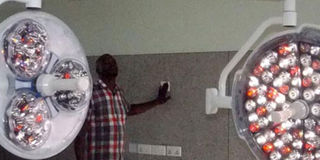Obongi health centre faces shortage of staff

A resident of Obongi County tests lights in the newly-constructed theatre at Obongi Health Centre IV on July 10, 2017. PHOTO/FILE
What you need to know:
- The district, with a population of 50,000 Ugandans and more than 120,000 South Sundan refugees, has only one ambulance.
Obongi Health Centre IV in Oboingi District is facing a shortage of personnel.
Of the 48 health workers that the Health ministry requires a health centre IV to have, the facility has only 39.
Daily Monitor has learnt that the required health workers include doctors, aesthetic officers, assistant nursing officers, midwives and an assistant health educator.
As a result, several expectant mothers said they lost their babies.
One of the women, Ms Harriet Bako, a primary school teacher at Dilokata Primary School in Ewafa Sub-county, says she visited Ewafa Health Centre II on June 28 and was later referred to Obongi Health Centre IV because of a pregnancy complication.
Once she arrived at the facility, the midwives on duty assessed her condition and recommended that she sees a doctor although an ultrasound scan conducted from a private clinic indicated that the foetus was normal and healthy. But her pain intensified a day later while at the facility waiting to see a doctor.
“My condition deteriorated further while the staff told me the only doctor at the hospital was busy at Palorinya Refugee Settlement since he is an employee of a non-governmental organisation (NGO),” she says.
On July 2, the doctor appeared at the facility and diagnosed her with malaria.
He then enrolled her on anti-malaria treatment and got her admitted before leaving the facility the same day.
In the absence of the doctor, another ultrasound scan conducted on July 6 showed that the foetus was lifeless and she started experiencing a thick yellowish discharge.
“When this doctor was called, he said he would come the next day and the midwives should not put me on a drip until he arrived. But he appeared on Thursday after I had lost the pregnancy,” she says.
By the end of last year, the facility had only one medical doctor who was recently interdicted by the district over abuse of office whereas the only doctor supporting the facility is reportedly an employee of Medical Teams International, an NGO.
Ms Gloria Mazira, a resident of Yakinemiji Village, Yakinemiji Parish, Obongi Town Council, also said she lost her unborn baby at Moyo Hospital after she was referred from Obongi Health Centre IV.
With a serious labour complication, she was rushed to Moyo Hospital when she failed to secure the services of a doctor to conduct an operation on her.
“When she complained, we immediately rushed her to the health centre but it took two days while we waited to see a doctor, who eventually failed to turn up. Meanwhile, it also took longer to refer us to Moyo Hospital and the unborn baby died in the process,” Ms Jane Pita, Ms Mazira’s attendant says.
Investigation
Mr Dominic Lomurecu, the acting district health officer for Obongi, says a committee had been set up to investigate the cause of the death although he admitted that the facility has a shortage of health workers.
“It is not our wish to lose mothers and babies during such incidents, we are questioning the circumstances,” Mr Lomurecu says.
Mr Richard Alu, the officer-in-charge of Obongi Health Centre IV, says: “Besides the other gaps, the district has two doctors, Dr Martin Owule (currently on a study leave), who will be resuming at the end of this year, and Dr Joseph Arike, who has been interdicted by the chief administrative officer,” he said.
Mr Alu added that the staff shortage had made it hard to deliver quality health services to the population.
Mr Alu said: “One of the critical challenges facing the facility is the absence of an ambulance to refer patients to nearby hospitals.’’
“The whole district only has one ambulance, which cannot serve adequately,” he added.
Obongi has 17 health centres with one health centre IV, six health centres III and 10 health centres II, serving both nationals and refugees.
Uganda Bureau of Statistics projects the population of Obongi at 50,000 and the district is hosting more than 120,000 refugees from South Sudan.




